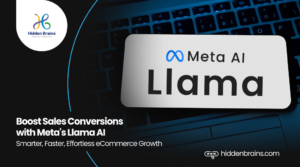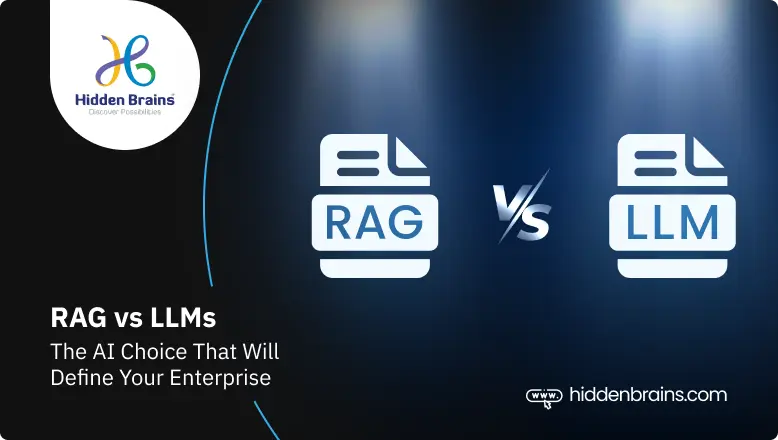Overview:
Meta’s latest Llama AI models; Scout and Maverick are gearing up to transform eCommerce by blending powerful natural language understanding, multimodal reasoning, and massive context windows. This blog explores what’s new in these models, why Llama matters for online shopping, and how it addresses classic challenges like converting leads, automating engagement, and personalizing interactions. You’ll get a clear roadmap for integrating Llama step by step into your store, along with cost considerations and strategic tips. If you want smarter chatbots, richer recommendations, and next-level conversions, this is the guide for you.
An AI assistant able to understand customers while holding natural conversations to drive more sales becomes a reality without any manual intervention. Llama AI from Meta offers eCommerce stores the ability to deliver this precise functionality.
Large Language Model Meta AI operates as the powerful family of AI models developed by Meta AI. The NLP-designed technology enables businesses to create automated dialogue systems and personalized materials and provide instant customer interaction.
Meta has reportedly unveiled the most advanced versions of its Llama 4 models — introducing Llama 4 Scout and Llama 4 Maverick. These models are designed to supercharge Meta AI across its platforms and are being hailed as best-in-class for multimodal capabilities.
More leads. Higher conversions. Smarter automation.This blog will walk you through everything you need to know about Meta’s Llama AI—and how you can use it to turn more visitors into paying customers effortlessly.
What’s New in Llama 4 Scout?
- A 17B active parameter model powered by 16 experts
- A record-breaking 10 million token context window
- Outperforms competitors like Gemma 3, Gemini 2.0 Flash-Lite, and Mistral 3.1 in benchmark tests
What Makes Llama 4 Maverick Stand Out?
- A 17B active parameter model with 128 experts
- Top-tier image grounding and visual alignment capabilities
- Can understand prompts in relation to visual elements and anchor responses to specific parts of an image
- Outperforms GPT-4o and Gemini 2.0 Flash
- Delivers DeepSeek v3–level reasoning and coding performance with half the parameters
- Exceptional performance-to-cost ratio, with its chat version scoring 1417 ELO on LMArena
In short, Llama 4 Maverick and Scout are pushing the boundaries of what’s possible with AI, especially in multimodal tasks.
Understanding Meta’s Next Llama AI Model
Meta’s Llama is one of the most exciting advancements in recent times. But what makes it unique? More importantly, how can it help eCommerce businesses? Let’s analyze.
What is Llama?
Llama (Large Language Model Meta AI) is Meta’s advanced AI model that uses natural language processing (NLP) and is equipped with multimodal capabilities. It is built with a decoder-only design and rotary positional embeddings (RoPE), unlike Open AI’s GPT versions that use GeLU and absolute positional embeddings. This AI model can create communications while producing textual content and customized experience delivery.
Llama succeeds with reduced parameter requirements, unlike other AI models that demand significant processing power. Llama operates with limited parameters, providing cost-effective scalability and efficiency for business AI solutions.
What’s New in Meta’s Llama Compared to Other AI Models?
Meta has not publicly displayed its upcoming Llama model, which will be released after March 10, 2025, but existing market trends and Meta’s strategy point towards the model’s features. After it achieves efficiency gains, Llama 3.3 will add unmatched features to its already robust text and image processing capabilities from Llama 3.2.
The upcoming version will bring enhanced reasoning abilities for problem-solving tasks that match or exceed the capabilities of GPT-4o alongside private companies. Whispers on X indicate that the next GPT-3 version might add video and speech processing to text and image functions to make interactions more robust.
The accessibility focus of Meta implies performance-enhancing capabilities, which include compact “Llama 4 Mini” models that function optimally on essential devices and minimum hardware requirements, benefiting businesses with limited research capabilities.
According to recent reports, the model receives training support from 100,000 Nvidia H100 GPUs, which allows the system to have bigger context capacity and improved multilingual processing capabilities. Meta demonstrates its long-term vision through these breakthroughs because Llama aims to be more than an operations tool but an industrial revolutionary asset for the eCommerce sector.
Why Meta’s Llama Matters for eCommerce?
The next Llama model isn’t just another tech upgrade for online store owners—it’s a game-changer for turning browsers into buyers. Its advanced NLP can decode customer intent with uncanny precision, analyzing search queries, chat messages, or reviews to predict what shoppers want before they articulate it.
It also offers customers experience chatbots that recognize their needs without waiting for requests and product recommendations that seem strangely perfect according to their needs.
eCommerce stores operating with Llama gain access to massive processing capacity for customer data sets that reveal patterns beyond essential detection, such as cause-effect relationships between cart abandonment and lead conversion probabilities.
Lightweight versions of this AI model make benefits affordable for smaller businesses, while multimodal features enable them to analyze feedback from text alongside images for retail customers. The next Llama model delivers essential benefits for eCommerce by providing capabilities to produce customized marketing approaches, automated support functions, and real-time inventory optimization.
This level of intelligence pairs well with advanced call recording systems too, helping businesses understand customer intent far beyond text-based inputs.
The Lead Conversion Challenge in eCommerce

For years, businesses have relied on email campaigns, retargeting ads, and discount offers to convert leads. These methods still work—to some extent. But they often stop at generating clicks rather than driving accurate conversions. Here’s why:
- Email Fatigue – Customers receive dozens of promotional emails daily. Unless your email stands out, it’s likely ignored or sent straight to spam.
- Retargeting Ads Overload – Seeing the same ad repeatedly doesn’t always encourage action. Instead, it can lead to ad fatigue, where customers tune out completely.
- Lack of Real-Time Engagement: Traditional marketing tools cannot provide the instant support that customers need during their point-of-decision while seeking answers or help with doubts and checkout processes.
- One-Size-Fits-All Approach: Most conventional marketing practices implement mass-group profiling, resulting in numerous potential customers skipping out on tailored product guidance.
How Llama Can Help eCommerce Businesses Overcome These Challenges

Meta’s next Llama AI model isn’t just a tool—it’s a lead-conversion powerhouse for eCommerce stores. By tapping into its advanced capabilities, online retailers can transform hesitant browsers into loyal buyers. Here’s how Llama can turbocharge your conversion rates across five key areas.
Advanced Personalization with Llama AI
Llama AI model has mastered natural language processing (NLP), which enables eCommerce businesses to develop hyper-personalized customer experiences. Llama 3.1’s advanced language processing power can seamlessly analyze complex datasets like buying patterns, browsing history, and users’ social media interactions. This AI model has the potential to craft highly personalized and accurate customer profiles for your eCommerce store, enabling you to tailor your offerings with unprecedented precision.
In addition, Llama can generate high-quality synthetic data that allows you to craft precise product descriptions and respond to complex customer requests. As a result, you get a higher chance to convert potential leads into your customers through contextual engagement.
💡Deep Insight: If a customer has a particular interest in browsing outdoor gears and frequently visits trekking and hiking communities on social media, Llama can detect a strong interest of that users in outdoor activities and help eCommerce stores recommend products accordingly.
Smarter Lead Scoring and Segmentation
Customer leads vary in readiness because some customers will buy instantly, but others require additional encouragement. Llama AI’s next model, released by Meta, eliminates this critical decision process through its predictive analysis, which determines lead conversion potential and directs eCommerce stores toward their best engagement approach.
Llama analyzes vast visitor data, including browsing patterns, past purchases, cart activity, and social media interactions, to create conversion scores that can transform unpredictable lead events into sales directions. Focusing your resources on customers who will deliver maximum sales value represents the core idea of this method, as it surpasses labour-intensive efforts in the eCommerce landscape. Llama has great scoring strengths and stands out in segmenting the leads it collects by creating actionable categories depending on customer behaviour and goals.

💡Deep Insight: Llama can anticipate subtle signals from human conversations. It can differentiate between a buyer who is hesitant and left the cart after adding an item and someone who spent on an eCommerce platform for less than 10 seconds. Based on that, it scores and ranks your potential leads with higher or lower chances of converting.
Dynamic Content Generation for Better Conversions
A famous saying is, “Great content doesn’t just inform—it sells”. Meta’s next Llama AI model does that for you. You can use its power to craft persuasive product descriptions and landing page content to translate casual clicks into confirmed orders. Llama 4 (the latest one to be released in 2025) is expected to develop dynamic content based on the buyer’s behaviour in real-time.
In addition, Llama can tailor content to specific customer segments. It identifies first-time visitors, genuine leads, and loyal customers and crafts personalized content accordingly. Its ability to understand the precise emotional quotients of a customer enables it to produce content optimized for conversions.
💡Deep Insight: Llama can accurately analyze customer data like reviews, search phrases, and surfing patterns to craft product descriptions that speak directly to their needs and make conversions faster.
Advanced Voice-commerce Capabilities
Meta AI’s Llama offers cutting-edge NLU (Natural Language Understanding) capabilities to analyze, understand, and respond to complex voice commands. The next generation of the Llama version has upgraded voice features that enable users to interrupt the model mid-speech and allow them to change the prompts. Furthermore, it understands various accents, dialects, and conversational nuances, enabling eCommerce businesses to broaden their customer base and increase the conversion rate.
It has top-notch voice-activated product discovery that enables customers to search for products using their native voice commands. Llama also facilitates voice-enabled checkout and support, simplifying the buyer’s ability to buy any product without using clicks and taps. It encourages customers to make buying decisions quickly.
💡Deep Insight: Llama provides voice-based customer support and addresses any customer inquiries in real-time. It also offers multimodal customer interactions combining voice and visual inputs that lead to faster purchases.
Automating Customer Engagement and Lead Nurturing
Customers need immediate attention because any unattended lead automatically translates into a missed opportunity for the business. The next version of Llama AI from Meta will enable chatbots and virtual assistants to operate day and night, providing customized assistance that resolves questions and directs prospects through the sales process. Llama utilizes its advanced natural language processing together with expected reasoning improvements to produce conversations that retain a sense of personhood and act with both proactively and timing that feels appropriate. The continuous operation of your store remains enabled by Llama nonstop throughout the day and night without letting any potential sales escape.
In addition, This AI model develops automated individualized messaging through email and text messages that match audience activities and choice preferences. When leads show interest in particular product categories, Llama deploys customized emails showing related products and special offers.
💡Deep Insight: Llama can adjust the communication tone based on the customers. For instance, if a customer is showing a friendly tone, Llama will respond in kind.
Practical Steps to Implement Llama in Your eCommerce Store
Adding Llama AI to your store should not be complicated; on the contrary, it can be pretty straightforward. Just do the following to gain the maximum number of leads and sales.
Accessing the Model
Getting started with Llama is straightforward, thanks to its open-source nature. Businesses can download the model weights from platforms like Hugging Face or Meta’s AI site under a community license—ideal for those with in-house tech skills. For a hands-off approach, cloud partners like AWS (via SageMaker JumpStart), Google Cloud (Vertex AI), or Microsoft Azure offer managed Llama deployments, handling the heavy lifting of infrastructure. These options let you scale from a small test to an entire store rollout, with pre-built APIs speeding up the process.
Integration
Llama pairs seamlessly with eCommerce platforms like Shopify or marketing tools like HubSpot. For Shopify, integrate Llama-powered chatbots or recommendation engines using Shopify’s API—plug it into your storefront with tools like LangChain for conversational AI. HubSpot users can sync Llama with customer data via its API to automate lead nurturing or personalize campaigns. Open-source frameworks like LlamaIndex can connect Llama to your product catalog, ensuring smooth data flow without reinventing the wheel.
Customization
To make Llama your own, fine-tune it with store-specific data like past sales, customer profiles, or chat logs. Start by feeding it a dataset—say, 6 months of order history or reviews—using a single GPU (e.g., an NVIDIA A100) or cloud services like Gradient for smaller budgets. Focus on key tasks: tweak it to nail product suggestions or craft responses in your brand’s voice. Even basic fine-tuning can boost relevance, turning generic outputs into targeted sales drivers.
Cost Considerations
Llama’s open-source edge keeps costs low compared to proprietary models like GPT-4o. Self-hosting a 70B-parameter Llama on AWS might run $1–$2 per hour on-demand or as low as $0.08/hour with spot instances versus GPT -4’s API fees of $30–$60 per million tokens.
Smaller models (e.g., 8B) can even run on a $80/month Codesphere plan. Factor in setup (a developer’s time) and hardware, but you’ll dodge recurring subscription costs—Meta claims Llama’s operation is roughly half the competitors’ price, making it a budget-friendly win for eCommerce.
Final Thoughts
A fundamental change occurs in eCommerce operations because Llama AI stands at the forefront of this development. Llama AI provides your online business with five essential capabilities that make it superior to standard AI systems through its personalized conversations, automatic engagement, and increase in conversion.
Using Llama proves beneficial beyond trends since it positions your business in the lead position compared to competitors. Leading AI technology delivers improved recommendations alongside enhanced customer interaction, which results in increased conversions.































































































![Sales & Distribution [Oil & Gas] Sales & Distribution [Oil & Gas]](https://www.hiddenbrains.com/blog/wp-content/themes/blankslate/assets/images/sales_and_distribution-icon.74d08193.svg)

![Fluid Terminal Management [Oil & Gas] Fluid Terminal Management [Oil & Gas]](https://www.hiddenbrains.com/blog/wp-content/themes/blankslate/assets/images/fluid_terminal_management-icon.4b3a27a4.svg)































![Sales & Distribution [Oil & Gas] Sales & Distribution [Oil & Gas]](https://www.hiddenbrains.com/blog/wp-content/themes/blankslate/assets/images/sales_and_distribution-icon.74d08193.svg?1.0.0)
![Fluid Terminal Management [Oil & Gas] Fluid Terminal Management [Oil & Gas]](https://www.hiddenbrains.com/blog/wp-content/themes/blankslate/assets/images/fluid_terminal_management-icon.4b3a27a4.svg?1.0.0)

























































































































































































